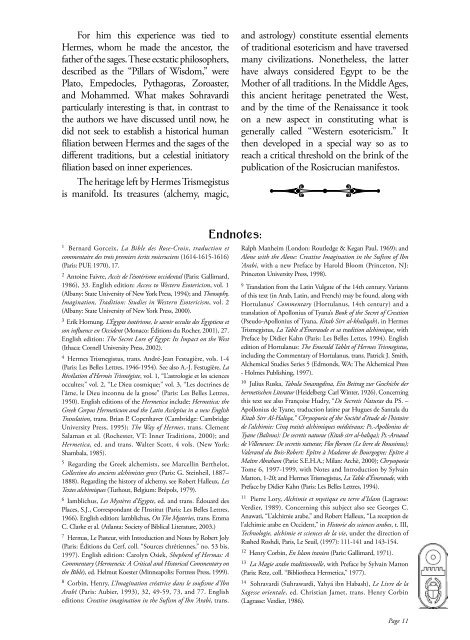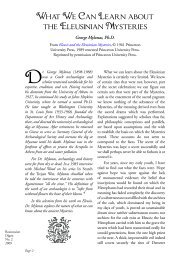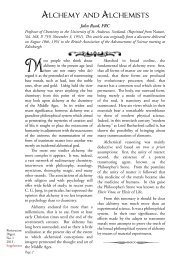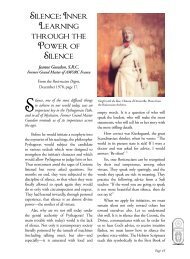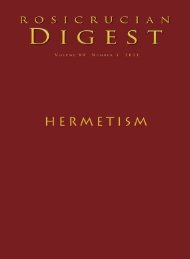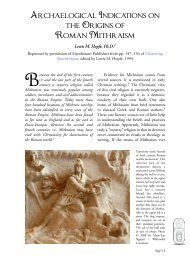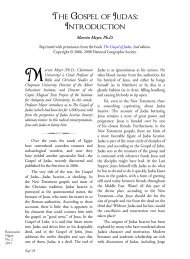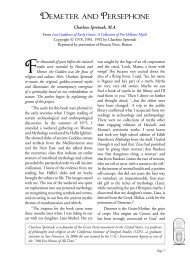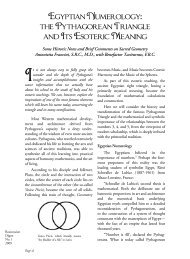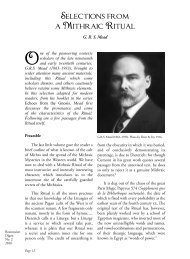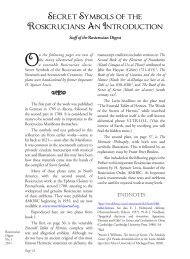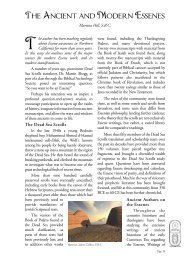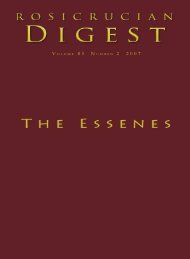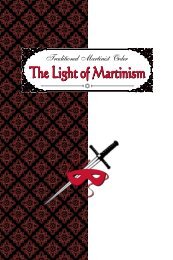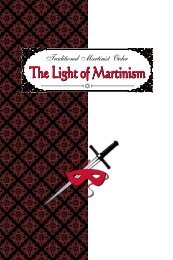Digest - Rosicrucian Order
Digest - Rosicrucian Order
Digest - Rosicrucian Order
Create successful ePaper yourself
Turn your PDF publications into a flip-book with our unique Google optimized e-Paper software.
For him this experience was tied to<br />
Hermes, whom he made the ancestor, the<br />
father of the sages. These ecstatic philosophers,<br />
described as the “Pillars of Wisdom,” were<br />
Plato, Empedocles, Pythagoras, Zoroaster,<br />
and Mohammed. What makes Sohravardi<br />
particularly interesting is that, in contrast to<br />
the authors we have discussed until now, he<br />
did not seek to establish a historical human<br />
filiation between Hermes and the sages of the<br />
different traditions, but a celestial initiatory<br />
filiation based on inner experiences.<br />
The heritage left by Hermes Trismegistus<br />
is manifold. Its treasures (alchemy, magic,<br />
and astrology) constitute essential elements<br />
of traditional esotericism and have traversed<br />
many civilizations. Nonetheless, the latter<br />
have always considered Egypt to be the<br />
Mother of all traditions. In the Middle Ages,<br />
this ancient heritage penetrated the West,<br />
and by the time of the Renaissance it took<br />
on a new aspect in constituting what is<br />
generally called “Western esotericism.” It<br />
then developed in a special way so as to<br />
reach a critical threshold on the brink of the<br />
publication of the <strong>Rosicrucian</strong> manifestos.<br />
1 Bernard Gorceix, La Bible des Rose-Croix, traduction et<br />
commentaire des trois premiers écrits rosicruciens (1614-1615-1616)<br />
(Paris: PUF, 1970), 17.<br />
2 Antoine Faivre, Accès de l’ésotérisme occidental (Paris: Gallimard,<br />
1986), 33. English edition: Access to Western Esotericism, vol. 1<br />
(Albany: State University of New York Press, 1994); and Theosophy,<br />
Imagination, Tradition: Studies in Western Esotericism, vol. 2<br />
(Albany: State University of New York Press, 2000).<br />
3 Erik Hornung. L’Égypte ésotérisme, le savoir occulte des Égyptiens et<br />
son influence en Occident (Monaco: Éditions du Rocher, 2001), 27.<br />
English edition: The Secret Lore of Egypt: Its Impact on the West<br />
(Ithaca: Cornell University Press, 2002).<br />
4 Hermes Trismegistus, trans. André-Jean Festugière, vols. 1-4<br />
(Paris: Les Belles Lettres, 1946-1954). See also A.-J. Festugière, La<br />
Révélation d’Hermès Trismégiste, vol. 1, “L’astrologie et les sciences<br />
occultes;” vol. 2, “Le Dieu cosmique;” vol. 3, “Les doctrines de<br />
l’âme, le Dieu inconnu de la gnose” (Paris: Les Belles Lettres,<br />
1950). English editions of the Hermetica include: Hermetica: the<br />
Greek Corpus Hermeticum and the Latin Asclepius in a new English<br />
Translation, trans. Brian P. Copenhaver (Cambridge: Cambridge<br />
University Press, 1995); The Way of Hermes, trans. Clement<br />
Salaman et al. (Rochester, VT: Inner Traditions, 2000); and<br />
Hermetica, ed. and trans. Walter Scott, 4 vols. (New York:<br />
Shambala, 1985).<br />
5 Regarding the Greek alchemists, see Marcellin Berthelot,<br />
Collection des anciens alchimistes grecs (Paris: G. Steinheil, 1887–<br />
1888). Regarding the history of alchemy, see Robert Halleux, Les<br />
Textes alchimiques (Turhout, Belgium: Brépols, 1979).<br />
6 Iamblichus, Les Mystères d’Egypte, ed. and trans. Édouard des<br />
Places, S.J., Correspondant de l’Institut (Paris: Les Belles Lettres,<br />
1966). English edition: Iamblichus, On The Mysteries, trans. Emma<br />
C. Clarke et al. (Atlanta: Society of Biblical Literature, 2003.)<br />
7 Hermas, Le Pasteur, with Introduction and Notes by Robert Joly<br />
(Paris: Éditions du Cerf, coll. “Sources chrétiennes,” no. 53 bis,<br />
1997). English edition: Carolyn Osiek, Shepherd of Hermas: A<br />
Commentary (Hermeneia: A Critical and Historical Commentary on<br />
the Bible), ed. Helmut Koester (Minneapolis: Fortress Press, 1999).<br />
8 Corbin, Henry, L’Imagination créatrice dans le soufisme d’Ibn<br />
Arabî (Paris: Aubier, 1993), 32, 49-59, 73, and 77. English<br />
editions: Creative imagination in the Sufism of Ibn ‘Arabi, trans.<br />
Ralph Manheim (London: Routledge & Kegan Paul, 1969); and<br />
Alone with the Alone: Creative Imagination in the Sufism of Ibn<br />
‘Arabi, with a new Preface by Harold Bloom (Princeton, NJ:<br />
Princeton University Press, 1998).<br />
9 Translation from the Latin Vulgate of the 14th century. Variants<br />
of this text (in Arab, Latin, and French) may be found, along with<br />
Hortulanus’ Commentary (Hortulanus, 14th century) and a<br />
translation of Apollonius of Tyana’s Book of the Secret of Creation<br />
(Pseudo-Apollonius of Tyana, Kitab Sirr al-khaliqah), in Hermes<br />
Trismegistus, La Table d’Émeraude et sa tradition alchimique, with<br />
Preface by Didier Kahn (Paris: Les Belles Lettes, 1994). English<br />
edition of Hortulanus: The Emerald Tablet of Hermes Trismegistus,<br />
including the Commentary of Hortulanus, trans. Patrick J. Smith,<br />
Alchemical Studies Series 5 (Edmonds, WA: The Alchemical Press<br />
- Holmes Publishing, 1997).<br />
10 Julius Ruska, Tabula Smaragdina, Ein Beitrag zur Geschiche der<br />
hermetischen Literatur (Heidelberg: Carl Winter, 1926). Concerning<br />
this text see also Françoise Hudry, “De Secretis Naturae du PS. –<br />
Apollonius de Tyane, traduction latine par Hugues de Santala du<br />
Kitab Sirr Al-Haliqa,” Chrysopoeia of the Société d’étude de l’histoire<br />
de l’alchimie: Cinq traités alchimiques médiévaux: Ps.-Apollonius de<br />
Tyane (Balinus): De secretis naturae (Kitab sirr al-haliqa); Ps.-Arnaud<br />
de Villeneuve: De secretis naturae; Flos florum (Le livre de Roussinus);<br />
Valerand du Bois-Robert: Epître à Madame de Bourgogne; Epître à<br />
Maître Abraham (Paris: S.E.H.A.; Milan: Archè, 2000); Chrysopoeia<br />
Tome 6, 1997-1999, with Notes and Introduction by Sylvain<br />
Matton, 1-20; and Hermes Trismegistus, La Table d’Émeraude, with<br />
Preface by Didier Kahn (Paris: Les Belles Lettres, 1994).<br />
11 Pierre Lory, Alchimie et mystique en terre d’Islam (Lagrasse:<br />
Verdier, 1989). Concerning this subject also see Georges C.<br />
Anawati, “L’alchimie arabe,” and Robert Halleux, “La reception de<br />
l’alchimie arabe en Occident,” in Historie des sciences arabes, t. III,<br />
Technologie, alchimie et sciences de la vie, under the direction of<br />
Rashed Roshdi, Paris, Le Seuil, (1997): 111-141 and 143-154.<br />
12 Henry Corbin, En Islam iranien (Paris: Gallimard, 1971).<br />
13 La Magie arabe traditionnelle, with Preface by Sylvain Matton<br />
(Paris: Retz, coll. “Bibliotheca Hermetica,” 1977).<br />
14 Sohravardi (Suhrawardi, Yahyá ibn Habash), Le Livre de la<br />
Sagesse orientale, ed. Christian Jamet, trans. Henry Corbin<br />
(Lagrasse: Verdier, 1986).<br />
Page 11


